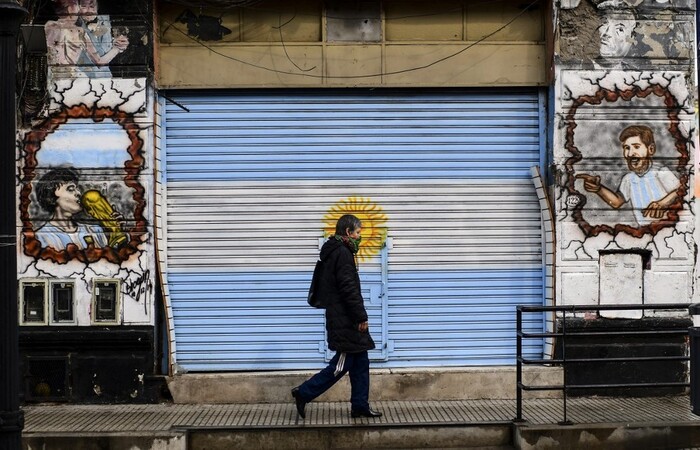RIO DE JANEIRO, BRAZIL – Argentina surpassed on Wednesday the 100,000 deaths due to covid-19, a figure that comes in the middle of the second wave of the pandemic and while the vaccination campaign, which has already immunized more than 45% of the population with one dose and 11% with two doses, is advancing.

According to the latest data from the Ministry of Health, the South American country has accumulated 100,250 deaths due to coronavirus since the beginning of the pandemic, after adding another 614 deaths this Wednesday.
In addition, in the last seven days, Argentina remained the fifth country globally with the most deaths per million inhabitants (48.98), ranking third in Latin America, behind Colombia and Paraguay. According to Statista, the leading German company specializing in market and consumer data.
The spread throughout the country of new variants, such as C.37 (Andean) or gamma (P.1, Manaus), has boosted the number of deaths in this second wave: in the last three months, a total of 41,708 people died from covid in Argentina, equivalent to some 458 deaths per day.
“These figures should come as no surprise. The strategy of one dose for everyone is not bad in a scenario of scarcity. However, the truth is that we still have many people over 60 years of age, pregnant women or people with comorbidities who have not reached the second dose,” said Elena Obieta, a member of the Argentine Society of Infectious Diseases.
SIGNIFICANT DROP IN CASES AND DEATHS
In the last two weeks, Argentina managed to reduce the number of new cases and deaths by about 20%, from an average of 20,141 positive cases at the beginning of July, the country is now at an average of 15,517 infections per day, while deaths have fallen from about 476 per day to 379 in the same period.
In jurisdictions such as the city of Buenos Aires, for example, the authorities have taken advantage of this decline to relax activities hitherto suspended, in addition to allowing the opening of fifteen ‘subte’ (subway) stations and the return of open-air cultural events with a maximum of 1,000 people as of August.
Likewise, almost all provinces have enabled winter tourism. Several of them, such as Buenos Aires, Córdoba, Mendoza, or the capital city itself, do not require a negative PCR to enter their territory.
However, experts warn that the number of infections continues to be very high, favoring the appearance of new variants.
“As long as we have so much community circulation of the virus, we will invariably have the appearance of new variants, the known or new ones,” says Elena Obieta, who regrets episodes of collective “indiscipline” such as the recent celebrations for America’s Cup.
FEAR FOR THE DELTA VARIANT
In this context, health authorities are concerned about the delta variant. So far, the Ministry of Health has reported fifteen positive cases of this strain, all of them related to travelers coming from abroad.
Although for the moment there is no community transmission of this variant detected in India in October 2020, Argentina has tightened controls on international passengers, with the National Directorate of Migration and the provinces working together to supervise compliance with mandatory isolation.
In this regard, the authorities have so far carried out 747 inspections and certified that 38% of travelers (287) did not comply with the quarantine, so they were reported to the courts.
Together with these increased controls, Elena Obieta suggests “increasing testing, improving the quality of traceability and, at the same time, accelerating the pace of vaccination”.
MORE THAN 20 MILLION PEOPLE VACCINATED
Thanks to the arrival of new batches from Sputnik V, AstraZeneca, and Sinopharm, the vaccination campaign has gained momentum in Argentina: 20,605,189 people have already received at least one dose of the vaccine, and another 5,113,342 have been fully vaccinated. However, as mentioned above, this has not significantly impacted the number of deaths per million in the last seven days.
The country received a total of 31,255,730 doses, most of them corresponding to Sputnik V (11,868,830), followed by AstraZeneca (10,314,900, adding those of the COVAX mechanism and Covishield) and Sinopharm (9,072,000).
The Argentine Executive also signed this Sunday a contract with the US laboratory Moderna to supply 20 million doses of its vaccine, which will arrive in the country from the first quarter of 2022.

